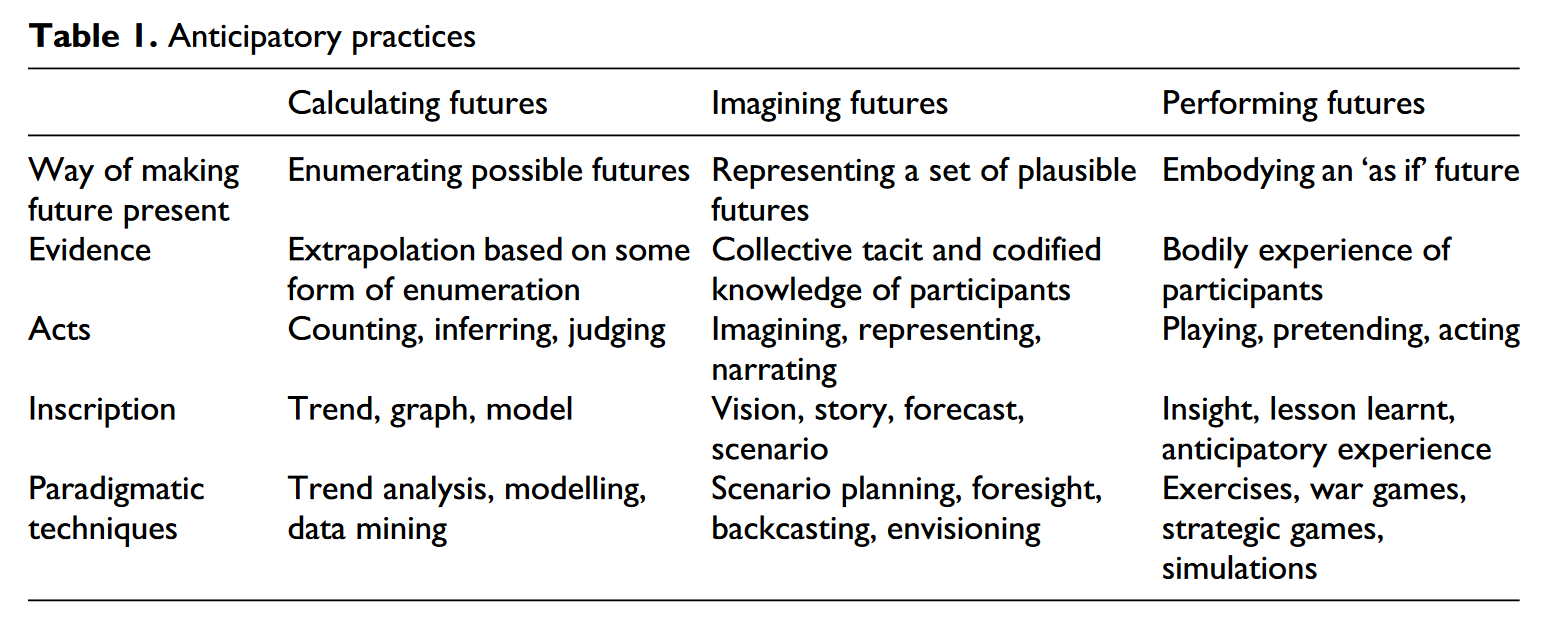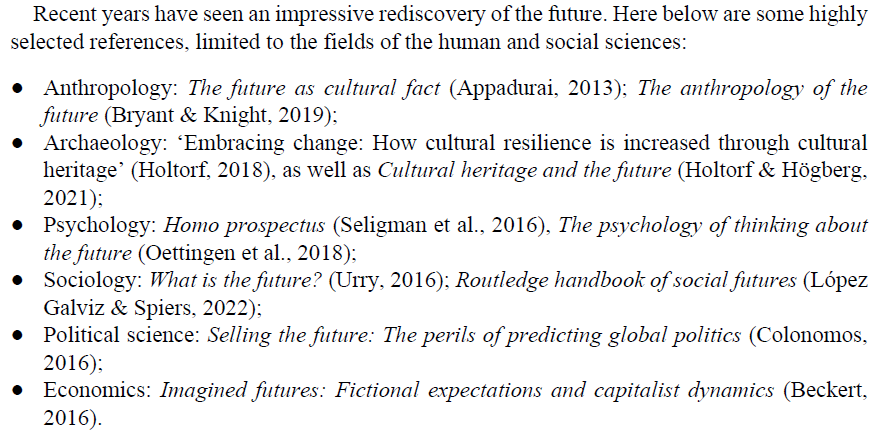Future
Also see, Longtermism
The Futures Cone, use and history

Anderson, Ben. ‘Preemption, Precaution, Preparedness: Anticipatory Action and Future Geographies’. Progress in Human Geography 34, no. 6 (2010): 777–98. https://doi.org/10/fd7brj.

Poli, Roberto, ed. Handbook of Futures Studies. Cheltenham: Edward Elgar, 2024.
Future as Crisis
Apocalyptic, existentially threatening and catastrophic futures.
Indigenous Experience
Indigenous people already live in Apocalyptic times that were deliberately arranged for by seller societies. Link to Indigenous
First Nations Australians don't have to imagine an apocalypse — we survived one
Postapocalypse Stress Syndrome and Rebuilding American Indian Communities by Lawrence Gross
Whyte, Kyle P. ‘Indigenous Science (Fiction) for the Anthropocene: Ancestral Dystopias and Fantasies of Climate Change Crises’. Environment and Planning E: Nature and Space 1, no. 1–2 (2018): 224–42. https://doi.org/10/gfvqff.
Rosalyn Bold, Indigenous Perceptions of the End of the World (New York: Springer, 2019).
Outlines of the Problem Futures
Literature that looks at the future with pessimism, predicting the demise of human civilisations or humans as species., cf. human extinction.
McKibben, Bill. Falter: Has the Human Game Begun to Play Itself Out? New York: Henry Holt, 2019.
Wallace-Wells, David. The Uninhabitable Earth: Life After Warming. New York: Tim Duggan Books, 2019.
Weisman, Alan. The World Without Us. New York: Thomas Dunne, 2007.
Thacker, Eugene. Cosmic Pessimism. Minneapolis: Univocal, 2015.
Zalasiewicz, J. A., and Kim Freedman. The Earth After Us: What Legacy Will Humans Leave in the Rocks? Oxford: Oxford University Press, 2008.
Meillassoux, Quentin. After Finitude: An Essay on the Necessity of Contingency. London: Continuum, 2008.
Positive or Utopian Futures
Fragile world ides and long-term future.
Manheim, David. ‘The Fragile World Hypothesis: Complexity, Fragility, and Systemic Existential Risk’. Futures 122 (2020): 102570. https://doi.org/10/gjjkcn.
Existential risks.
Beard, S. J., and Phil Torres. ‘Ripples on the Great Sea of Life: A Brief History of Existential Risk Studies’. SSRN Scholarly Paper. Rochester, 2020. https://doi.org/10.2139/ssrn.3730000.
Maintaining the link to the biosphere.
Holt, Lauren Adele. ‘Why Shouldn’t We Cut the Human-Biosphere Umbilical Cord?’ Futures 133 (2021): 102821. https://doi.org/10/gqxqrb.
History as Future
Past events that model future occurrences such as extinctions.
The concept of "long now"
Ecological Futures
Carpenter, Stephen R. “Ecological Futures: Building an Ecology of the Long Now.” Ecology 83, no. 8 (2002): 2069–83. https://doi.org/10/c8b4jv.
Peterson, Garry D., Graeme S. Cumming, and Stephen R. Carpenter. “Scenario Planning: A Tool for Conservation in an Uncertain World.” Conservation Biology 17, no. 2 (2003): 358–66. https://doi.org/10/bjpjst.
Human Futures
Humans have a poor ability to imagine futures. They do it under the constraints of multiple biases.
"Our ability to project ourselves forward in time and experience events before they happen enables us to learn from mistakes without making them and to evaluate actions without taking them. If nature has given us a greater gift, no one has named it. And yet, as impressive as it is, our ability to simulate future selves and future circumstances is by no means perfect. When we imagine future circumstances, we fill in details that won’t really come to pass and leave out details that will. When we imagine future feelings, we find it impossible to ignore what we are feeling now and impossible to recognize how we will think about the things that happen later. [...] Foresight is a fragile talent that often leaves us squinting, straining to see what it would be like to have this, go there, or do that."
Gilbert, Daniel Todd. Stumbling on Happiness. New York: Knopf, 2009.
Assessments of future:
Folke, Carl, Stephen Polasky, Johan Rockström, Victor Galaz, Frances Westley, Michèle Lamont, Marten Scheffer, et al. “Our Future in the Anthropocene Biosphere.” Ambio 50, no. 4 (2021): 834–69. https://doi.org/10/gjnhh9.
Dunn, Rob R. A Natural History of the Future: What the Laws of Biology Tell Us About the Destiny of the Human Species. New York: Basic Books, 2021.
Vettese, Troy, and Drew Pendergrass. Half-Earth Socialism: A Plan to Save the Future from Extinction, Climate Change, and Pandemics. London: Verso, 2022.
In fiction:
Robinson, Kim Stanley. The Ministry for the Future. New York: Orbit, 2021.
Other:
Ferguson, Kennan. “Why Did They Assume Only Humans Had Politics?” Political Theory 51, no. 1 (2023): 74–85. https://doi.org/10/gtvb75.
Ward, Peter. “What Will Become of Homo Sapiens?” Scientific American 300, no. 1 (2009): 68–73. https://doi.org/10/fngtjf.
Ways to Explore Futures
- forecasting
- Scenarios
Cork, Steven, Carla Alexandra, Jorge G. Alvarez-Romero, Elena M. Bennett, Marta Berbés-Blázquez, Erin Bohensky, Barbara Bok, et al. ‘Exploring Alternative Futures in the Anthropocene’. Annual Review of Environment and Resources 48, no. 1 (2023): 25–54. https://doi.org/10/gtfnfs.
Journals
- Futures, Elsevier, for the Interdisciplinary Study of Futures, Anticipation and Foresight
- Journal of Futures Studies, the Graduate Institute of Futures Studies, Taiwan, futures-oriented research and thinking
- Futures and Foresight Science, Wiley, methods that aid anticipation of the future
Big Future
Spier, Fred. Big History and the Future of Humanity. 2nd ed. 2005. Reprint, Malden: Wiley Blackwell, 2015.
Connolly, William E. Facing the Planetary: Entangled Humanism and the Politics of Swarming. Durham: Duke University Press, 2017.
Wallace-Wells, David. The Uninhabitable Earth: Life After Warming. New York: Tim Duggan Books, 2019.
References
Criado, Tomás Sánchez. “Anthropology as a Careful Design Practice?” Zeitschrift Für Ethnologie (ZfE) / Journal of Social and Cultural Anthropology (JSCA) 145, no. 1 (2020): 47–70.
Valentine, David, and Amelia Hassoun. “Uncommon Futures.” Annual Review of Anthropology 48, no. 2019 (2019): 243–60. https://doi.org/10/gkddv4.
Backlinks